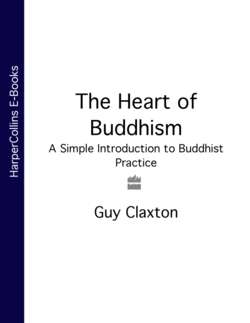Читать книгу The Heart of Buddhism: A Simple Introduction to Buddhist Practice - Guy Claxton - Страница 20
Оглавление3 NO HARD FEELINGS
Some say the world will end in fire,
Some say in ice.
From what I’ve tasted of desire
I hold with those who favour fire.
But if I had to perish twice,
I think I know enough of hate
To say that for destruction ice
Is also great
And would suffice.
– Robert Frost
LET us now go a little more deeply into the kind of distress that is actually unnecessary, home-made. The problem we seem to be trying to solve is the problem of how we feel. We don’t feel good enough, enough of the time. According to the conventional game plan the way to feel better is to acquire more possessions, make sure you’ve got lots of savings, reduce uncertainty, get a secure job, surround yourself with people who love you and will take care of you if you fall on hard times, and stay healthy. In other words cut out, as far as you can, the occasions on which you think you would be sad, anxious, lonely or in pain. Then, once you have got that nailed down as tightly as possible, try and feed back in some of the fun and spontaneity which the game plan has necessarily squeezed out – go to parties, have affairs, play bridge for slightly heavier stakes than you really ought to, take up a new hobby, plan an extension to the house, put in for promotion. So all this activity, the stuff of life, is not for its own sake. The size of the car and the neatness of the garden are not important in themselves. They only matter because our own particular version of the game plan leads us to believe that we will be happier with a BMW and some exotic shrubs.
In order to understand the game plan better, and especially where it begins to go wrong, we need to look more carefully into this matter of feelings; first the ones we want to get rid of, and then the ones we want to hang on to. In particular we need to call into question our common sense attitude towards our feelings. This attitude is rather ambivalent. On the one hand we tend to view our feelings as responses to events. We say, ‘You made me angry,’ or ‘That remark really hurt me,’ as if feelings are inevitably triggered off by certain kinds of situations which impinge on us from outside. On the other hand we struggle with these feelings as if we had some control over whether they occurred to us or not. ‘I did my best to keep my temper.’ ‘I tried not to let his tactlessness upset me.’ ‘She’s trying to make me jealous but I’m damned if I’m going to let her.’ It does not look as if we assume any responsibility for the occurrence of feelings, but only, if at all, for controlling them.
Coupled with this sense of feelings as caused is the tacit assumption that they are not meant for anything. We do not feel for a purpose. If someone asks us why we are looking so sad, we do not usually answer in terms of an effect we are hoping to create, but rather in terms of the circumstances which we think brought about the sadness. Yet this too may be a misrepresentation of our own psychology. We are perhaps hiding from ourselves the extent to which we do use feelings to try to elicit reactions we would like in other people. Is there not, at least sometimes, an intention to punish another person with our anger, or to win a little sympathy with our hangdog expression or our tears, or to get someone to take care of us by being feeble? We can see such ploys in children, yet tend to develop tactical blindness towards our own manipulativeness – because, of course, manipulative is something that nice people are not supposed to be. Thus as we look at feelings, we need to beware of taking them at face value, because their face value may not match their real value at all. In the pursuit of clear vision about our predicament, Buddhism does not promise us a rose garden. On the contrary, we may not like what we see at all.
Fear
Fear goes by many names: anxiety, apprehension, embarrassment, squeamishness, disgust, panic, amongst others. Fear is the first feeling of threat. When something we believe we need is not forthcoming, or when what we have is taken away, we feel fear. Whenever we feel fear, it is because in one way or another we believe that our survival is at stake. So whatever we consider to be necessary, if we are in danger of losing it, or not getting it, we feel afraid, anxious. If we want to go on living – as most of us surely do – then we feel afraid when there is not enough air, or food, or warmth. Fear is the body saying, ‘Get out of this one quick.’ Change the situation to one that is more congenial. Run away. Get help. Do something. In circumstances we perceive as adverse, the body is mobilized for change, and the way this general call-to-arms feels, is what we call fear. It is a vital aspect of being alive.
